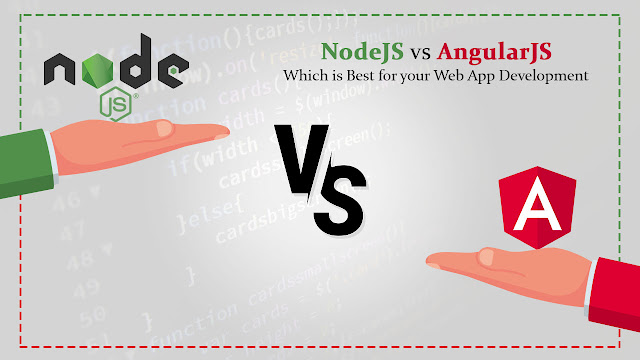Nowadays, most web apps are developed using JavaScript or any of its iterations, and businesses tend to misconceptualize that all JavaScript variants can be used to create standalone web applications. Most common being the argument of NodeJS vs. AngularJS, but ironically, AngularJS and NodeJS are JavaScript-based technologies that perform different sets of tasks and functions. Let’s understand the difference between these two.
Node vs. Angular: General Difference
To make development easier and execute JavaScript applications outside of browsers, NodeJS is a cross-platform runtime environment that provides a large library of JavaScript modules. Google created the web application development framework known as AngularJS. In order to build dynamic, single-page client-side web applications, it employs HTML as a template language and extends its characteristics. The AngularJS architecture was created by Google exclusively as a web app development platform. As a cross-platform runtime framework, NodeJS was created based on Google's V8 JavaScript engine.
How to use NodeJS and AngularJS?
Because NodeJS is a JavaScript runtime environment, you must install it on a computer before using it to create server-end scripts. As a framework, Angular can be easily inserted into HTML to expand its functionality and create online apps. Developers utilize Angular, a web framework in and of itself, to automate routine development tasks. Unfortunately, Node cannot be used as a web framework, but it does allow code created using any NodeJS-based framework, including Sails.js, Express.js, Socket.io, Meteor.js, and Hapi.js.
Functions of Angular and Node
Developers can construct a variety of web application components by extending the HTML syntax. Scope, data binding, deep linking, directives, templates, filters, routing, and dependency injection are useful elements of AngularJS that make building dynamic and single-page web applications simpler.
NodeJS, a server-side framework, provides a range of cutting-edge features required by programmers to build networking and server-side applications. Programmers will find it simpler to construct websites that stream video, single-page websites, and similar I/O-intensive web apps, thanks to the functionality offered by NodeJS.
Wrapping Up
One must take the application need into account while choosing between Angular JS and Node JS. While Node JS requires a runtime environment, Angular JS is a client-browser-based framework. Both seem like fascinating, promising choices within their respective fields. You can either use them individually to develop unique solutions or create a multi-layered application that uses a MEAN technology stack that employs a combination of different JavaScript variants, i.e., Express, Angular, and Node, along with MongoDB. Whether you need custom software development using MEAN stack technology or web apps built using Node or Angular, Vindaloo Softtech has a wide pool of developers to fulfill your needs. Contact us.
To learn more differences, please visit: https://blog.vindaloosofttech.com/nodejs-vs-angularjs/
